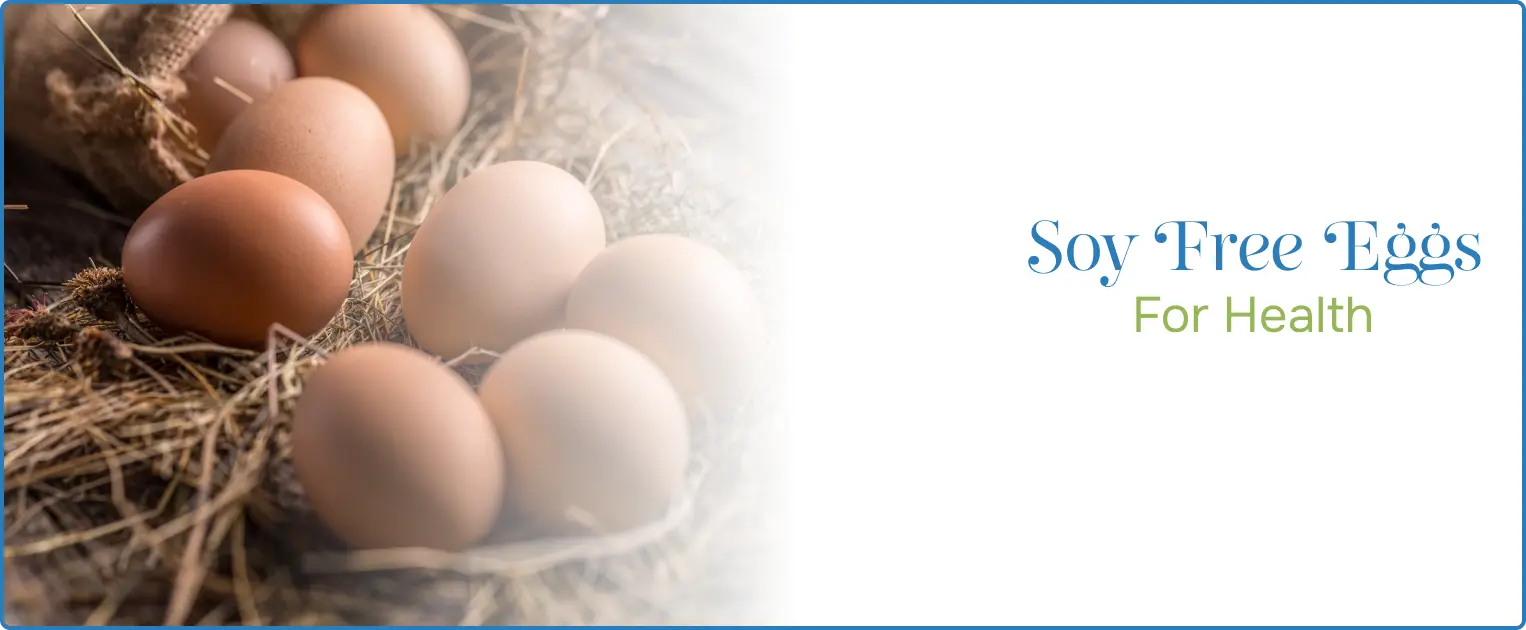
What are Soy Free Eggs?
Soy-free eggs are laid by chickens that are not fed with soy-based feed, in contrast to regular eggs, which are produced by chickens fed with feed that is almost certainly soy-based. Soy-free eggs are beneficial because they do not contain any soy estrogen – something that is of increasing concern for some people.
Soy-free eggs are a healthier alternative, especially for those allergic to soy or concerned about these high estrogen levels. Additionally, pasture-raised hens usually eat more natural foods such as grass and bugs. Soy-free eggs are also often GMO-free and packed by hand without commercial washing, making them a more natural and sustainable option.
Let’s take a look at the history of soy in foods and the potential dangers of it.
“Eat More Soy,” They Said – A Short History of Soy in Food
Just a few years ago, we were told to eat more soy. Soy milk. Soy cheese. Meat substitutes made with soy. Meal replacements from soy. And even – soy butter.
Surging interest in soy grew excessively from the early 1990s on. But now, more light on the subject throws a graying shadow of concern on soy. Soybean products contain a high amount of estrogens, and too much soy estrogen causes cancer and other health issues. In fact, both men and women share concerns about the effects of soy.
Are these soy health concerns truly worth consideration? Is this just an American racket that has unfounded bases? Or are the concerns wider spread?
We see a steady increase in cancer. And we do well to consider what we might do to avoid it. Since phytoestrogens (plant-based estrogens) are a problem, why not reduce our intake of them? And soy estrogen is a primary culprit due to the abundance of phytoestrogen in it.
Furthermore, too much estrogen can cause weight gain. So, could the obesity plague be helped by feeding our children fewer soy products?
Do local small-scale farms have an answer for this problem? Consider these soy-free eggs for your next scrambled egg breakfast or hard-cooked egg recipe.
Why Buy Soy-free Eggs?
Today’s farming practices focus on producing mass volumes at the lowest possible prices. Pasture-raised hens eat more natural food and thus do not produce as much volume as these operations want to see. But confinement and soy-rich feeds provide an answer to increased production at lower costs, but perhaps at a higher cost to the health of the consumer than we realize.
Do eggs have soy estrogen in them? Studies show that when farmers feed hens soy, the soy estrogen is carried through into the eggs. As we said, soy health concerns are rising rapidly. One study’s conclusion states: “Isoflavone concentrations in egg yolks, liver, and kidneys of laying hens can be successfully increased by supplementing the diet with an isoflavone rich source. . . A soy-free diet can produce hen eggs and tissues without quantifiable isoflavones levels.”
Egg allergies — yes, some folks choose to try eggs from soy-free-fed hens for this reason. Soy proteins transfer into the eggs from the feed. So, if you have egg allergies, consider the possibility of soy-free eggs from pasture-raised hens via Swiss Villa.
Soy lecithin often produces soy allergies. We find it in many of the processed foods in America today. Surprisingly to many, a good lecithin naturally occurs in egg yolks where no soy has been fed to chickens. This lecithin naturally found in egg yolks without soy feeding holds health benefits versus the soy lecithin!
And do not forget the soy health concern that too much estrogen causes cancer.
Will we subject our family’s health to the dangers mega farming presents? Local farms, that is, small-scale family farms, offer sustainable operations including products such as pasture-raised eggs. Care and concern in the production of healthful food yields quality food products that can be healthier.
GMO-Free, Farm-Packed, Unclassified Eggs without Commercial Washing
Selecting these soy-free eggs has some additional benefits. Consider the sustainability and locavore vitality of these small farms: growing more of their own feed; letting the hens eat freely from the outdoor grasses and other vegetation, as well as grit and bugs; smaller footprint structures for protection; family involvement in feeding, watering, and egg gathering; and last of all, eggs without commercial washing and packed by hand.
GMO concerns are another reason to avoid soy-fed eggs, soy-fed dairy, and soy-fed meat.
Perhaps, another question to consider is this: Is cheaper food really cheap? Perhaps that depends on how much you consider your health to be worth. Keep in mind that if estrogen causes cancer, what will we pay to treat cancer if we could possibly avoid it by reducing soy intake?
Consider Local Food From Swiss Villa
Swiss Villa works somewhat as a food hub, working with small local farms. Numerous small-scale, mixed-use farmers with a few hundred pasture-raised eggs sell them via Swiss Villa to help supplement their livelihoods. Ask your local market to stock these family-farm-fresh eggs in their dairy cooler, or purchase them directly from our online shop.
Because of the support of locavores, these small farms realize sustainability. And they understand eggs without commercial washing. They sincerely appreciate this opportunity and desire to do their best to provide fresh, quality, healthful eggs for you to enjoy. Stronger, healthier communities unfold with the promotion of local small-scale farms.
We hope this information has been helpful for you to make informed decisions about your food choices. If you are concerned about the potential health risks associated with soy, we encourage you to try soy-free eggs from local farms. By supporting small-scale, sustainable operations, you not only prioritize your own health but also contribute to the vitality of local communities.
Consider asking your local market to stock these family-farm-fresh eggs, or purchase them directly from our online shop at Swiss Villa. Let’s make a conscious effort to choose healthful food for ourselves and our loved ones.


